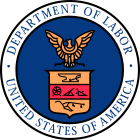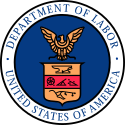 | |
| Agency overview | |
|---|---|
| Formed | 1981 |
| Jurisdiction | Federal government of the United States |
| Headquarters | Frances Perkins Building Washington, D.C. |
| Employees | 1,000 |
| Agency executive | |
| Website | www |
The Office of Workers' Compensation Programs administers four major disability compensation programs which provide wage replacement benefits, medical treatment, vocational rehabilitation and other benefits to certain workers or their dependents who experience work-related injury or occupational disease. [2]
